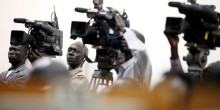“He was told he was interfering with the state and should he continue with this work, he is most likely to lose his life.”
– South Sudanese journalist details threats received by a colleague –
23rd September 2015 – “Journalists in South Sudan are working in one of the most dangerous and challenging countries in the East and Horn of Africa”, said today Hassan Shire, Executive Director of the East and Horn of Africa Human Rights Project (EHAHRDP) alongside the Community for Progress Empowerment Organisation (CEPO) and South Sudan’s National Editors’ Forum. “The worsening pattern of intimidation, harassment, arbitrary arrests, and attacks against journalists has already resulted in the death of 7 journalists this year, and has created a pervasive climate of fear and tension within the media community.”
On 19th August 2015, a journalist working for the New Nation newspaper and the Corporate Newspaper, Peter Moi Julius, was shot dead by unidentified gunmen in the Jebel area of Juba. In May 2015, unknown gunmen killed a freelance reporter in Akobo. These assassinations come mere months after unknown armed men killed 5 journalists in an ambush on 25th January 2015. There have been no official investigations into these killings, however according to the Committee to Protect Journalists, 5 of them were directly connected to their work as journalists.
The situation has gradually deteriorated throughout 2015, and in August 2015 alone, the South Sudanese National Security Services closed down 3 different news outlets. Al Rai Newspaper, Citizen Newspaper and the Free Voice Office, which hosts Radio Tamazuj, Voice of America and the South Sudan in Focus program, were all targeted and forced to close down their offices. In addition, at least 5 journalists have been arbitrarily arrested or had their equipment confiscated since May 2015. They were all released without charges several hours later, however George Livio, a journalist for the UN backed Radio Miraya, is still being held after being arrested in August 2014.
Harassment, intimidation and death threats have all been used to discourage journalists from conducting reporting or providing a platform to those critical of the government or voicing concerns over the on-going conflict and Intergovernmental Authority on Development-led peace agreement process. The latest ceasefire, which was signed on 28 August 2015, has since been repeatedly violated.
Since April 2015, there have been over 20 reported incidents of journalists receiving threats from individuals claiming to be officials from the government or the National Security Services. Nhial Bol Aken, the Editor-in-Chief of The Citizen newspaper, was forced to step down on 9 September 2015 due to the threats to him and his family’s security. On 25 August 2015, one journalist was detained for several hours by officials at Juba International Airport and told that he and three other journalists had little time left before they were “sprayed with bullets”. These threats are not restricted to journalists within the country, but also concern South Sudanese journalists travelling in the East Africa region.
The East and Horn of Africa Human Rights Defenders Project has been documenting the increasingly dangerous landscape for journalists, and human rights defenders more broadly, since the outbreak of the conflict in December 2013. The situation in South Sudan has dramatically deteriorated, and become one of the worst human rights and humanitarian crises in the world today. Unprecedented levels of violence have seen indiscriminate killings, rape, sexual violence, abduction, destruction of properties and the recruitments of children.
buy antabuse online buy antabuse no prescription
buy synthroid online www.adentalcare.com/wp-content/themes/medicare/languages/en/synthroid.html no prescription
Journalists play a key role in reporting on the brutal human rights abuses taking place during the conflict and advocating for the population of South Sudan caught in the crossfire of this destructive civil war. However, since the beginning of the year, South Sudan-based CEPO has documented a relentless campaign against journalists orchestrated mainly by the South Sudanese government and its Security Services.
On 16 August 2015, the President of South Sudan himself threatened to kill critical journalists for shaming the country’s image. President Salva Kiir made the statement at Juba Airport, before flying to Addis Ababa to attend the most recent peace talks with former Vice President Riek Machar.
The government of South Sudan should cease all intimidation, harassment and threats against journalists, and should also ensure a safe space for human rights defenders to continue doing their crucial work.
buy cialis black online www.adentalcare.com/wp-content/themes/medicare/languages/en/cialis-black.html no prescription
The United Nations Human Rights Council, currently in session, should prioritise and address substantively the deteriorating human rights situation in South Sudan.
buy udenafil online www.adentalcare.com/wp-content/themes/medicare/languages/en/udenafil.html no prescription

